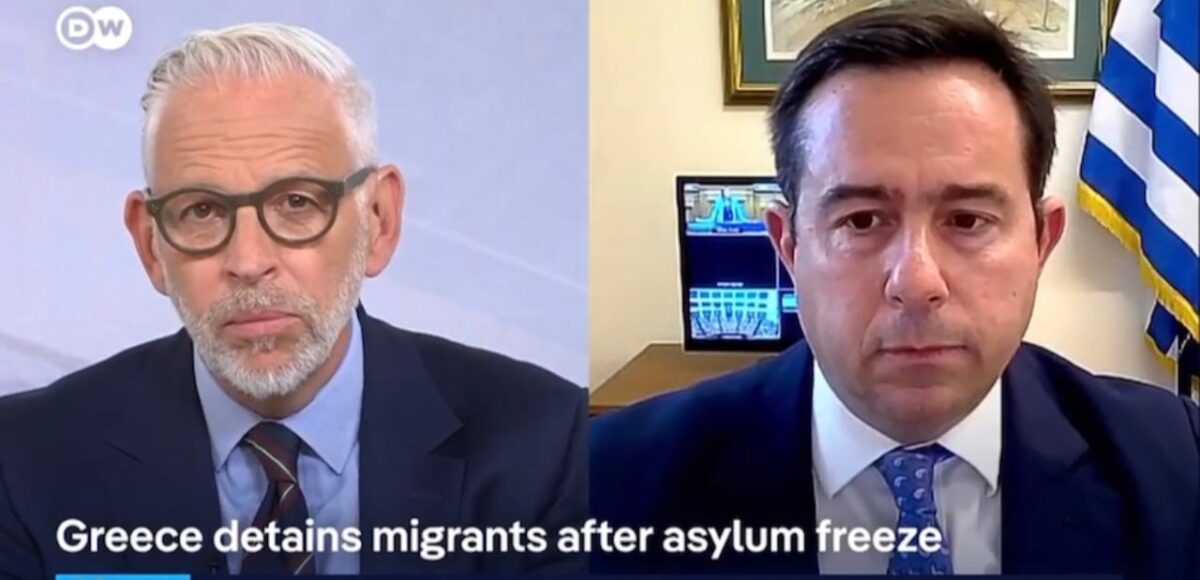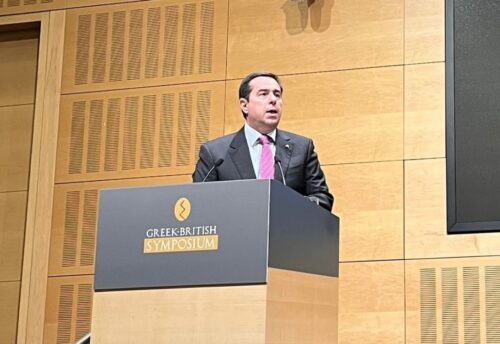
Mitarachi to DW News: “We cannot allow smugglers to decide who comes and who lives in the European Union”
In an interview with DW News, the Parliamentary Spokesperson of New Democracy and former Minister of Migration and Asylum, Mr. Notis Mitarachi, responded to key questions regarding migration policy, European responsibility, and returns. He emphasized the hybrid nature of the pressure Greece—and particularly Crete—is facing from Libya.
“We have experienced a hybrid pressure, a hybrid threat in Crete, arising from Libya. Smugglers are now running an organized operation, trying to move thousands of people—economic migrants seeking a better future. I understand that. But let me be clear: we cannot allow smugglers to decide who comes and who lives in the European Union.”
Responding to a question about whether the European Union has left Greece alone to deal with this issue, he underlined that “the recently adopted Pact on Migration and Asylum has made progress in promoting solidarity, but the Dublin Regulation still dominates. The country of first reception holds the main responsibility. Greece has proposed the creation of a common European protection space, but Northern countries disagree and continue to shift the burden onto us.”
On the issue of migrant detention for up to 18 months, Mr. Mitarachi defended the legality of the framework, stating that “under national and international law, people who are to be returned can be detained. This has been the legal framework in Greece for many years. People not eligible for international protection must be returned. It is critical to protect the concept of asylum. Europe has failed to ensure effective returns. Countries of transit and origin have not cooperated, and this has created negative sentiment among European societies.”
Addressing opposition claims that this practice is unconstitutional, he stressed that “it is an act of Parliament. It has not been challenged in the Supreme Court, and no decision exists that supports the opposition’s position. There are people on the Left who believe countries should have no borders. That is not our position, and I believe it is no longer the position of the majority of Europeans.”
Finally, regarding the impact on tourism and local communities, Mr. Mitarachi noted “we have an obligation to those applying for asylum, but also to local communities. I often received letters about the conditions of asylum seekers—very rarely, however, did I receive letters asking about the impact on the local population. When a large number of arrivals occurs in small areas, it obviously drains our resources and harms social cohesion. People have the right to live in safety and dignity in their own homes.”
- So your party has talked about a migrant invasion. Is that really justified?
I think we have had a hybrid pressure hybrid threat in Creta arising from Libya. You know that the European Union has attempted to work with the Libyan authorities to mitigate the impact of the smuggling networks, but the recent attempt by the European Commission and the ministers of Italy, Malta and Greece were not successful. They were not received by the authorities in Libya. It is clear that smugglers are now running a major operation trying to move thousands of people from Libya, economic migrants, young people seeking. I can understand it from their point of view, a better future. Europe should have a migration policy. But let me be clear. We cannot allow smugglers to decide who comes and lives in the European Union.
- Do you think that the European Union is leaving Greece alone with this problem?
The recently adopted pact Impact on migration and asylum has made good progress in securing the concept of solidarity, but still, under the Dublin regulation, would still dominate European thinking on migration. It is the country of first reception that has the primary responsibility. You know, Greece has suggested in the past that there should be a common European protection space. Migrants that have been accepted as deemed eligible for international protection should be allowed to travel within the European Union. It is the countries on the North that strongly disagree and still insist that it is our responsibility, and what has happened in the past in political debate, you have had countries accusing Greece for having a top migration policy, but at the same time, if any migrants from Greece moved to their country, they reacted against Greece now.
- But you start now detaining people for up to 18 months with no charges. Of course. Does that not violate the detainees human rights?
Not at all. Under national international law, people that are to be returned can be detained. And this is the legal framework in place in Greece for many, many years. People that are not eligible for international protection must be returned. And I think it is very critical if we want to protect the concept of asylum and international protection. The return side of the equation must work more efficiently. Europe has failed over the years to secure returns. Countries of transit or countries of origin have not cooperated with the European Union. That has created a lot of negative sentiment to European populations that, on the one hand, believe that refugees should be granted protection, but those coming irregularly illegally into the European Union, there must be an effective way to be returned with safety and dignity. Back home.
- But you’re on a position in Greece says that this is unconstitutional. What do you say to that?
It is an act of Parliament. It has not been challenged in the Supreme Court, and there is no Supreme Court decision that agrees with the opposition opinion. The people on the left that believe that countries should have no borders and everybody should be allowed to come in. That’s not our position. And I think that’s not the position of the majority now of European people, even if they’re voting for the center of the left.
- Now, you say also you need to protect tourism. Is that a valid argument?
I mean, we have an obligation towards people coming to Greece and applying for asylum. We have an obligation also towards the local communities. And I have received many times letters when I was Minister for migration with concerns about the well-being of the asylum seekers, which are well respected and well received, but very, very rarely. I got letters asking whether the local communities are impacted and if you have very large number of arrivals in small communities, that obviously is draining our resources and creating a lot of social cohesion issues. I mean, people have a right to live in safety and dignity in their own houses.

